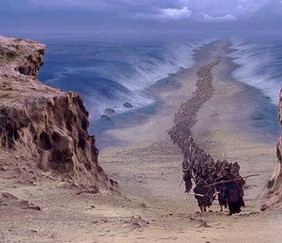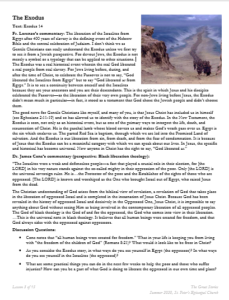
Text: Exodus 14
Fr. Lorenzo’s commentary: The liberation of the Israelites from Egypt after 400 years of slavery is the defining event of the Hebrew Bible and the central celebration of Judaism. I don’t think we as Gentile Christians can really understand the Exodus unless we first try to see it from a Jewish perspective. For devout Jews, the Exodus is not merely a symbol or a typology that can be applied to other situations. The Exodus was a real historical event wherein the real God liberated a real people from real slavery. For Jews living before, during, and after the time of Christ, to celebrate the Passover is not to say, “God liberated the Israelites from Egypt” but to say “God liberated us from Egypt.” It is to see a continuity between oneself and the Israelites because they are your ancestors and you are their descendants. This is the spirit in which Jesus and his disciples celebrated the Passover—as the liberation of their very own people. For non-Jews living before Jesus, the Exodus didn’t mean much in particular—in fact, it stood as a testament that God chose the Jewish people and didn’t choose them.
The good news for Gentile Christians like myself, and many of you, is that Jesus Christ has included us in himself (see Ephesians 2:11-19) and so has allowed us to identify with the story of the Exodus. In the New Testament, the Exodus is seen, not only as an historical event, but as one of the primary ways to interpret the life, death, and resurrection of Christ. He is the paschal lamb whose blood covers us and makes God’s wrath pass over us. Egypt is the sin which enslaves us. The parted Red Sea is baptism, through which we are led into the Promised Land of salvation. And the Exodus is our liberation from sin, from death, and from the fear of condemnation. It is because of Jesus that the Exodus can be a meaninful category with which we can speak about our lives. In Jesus, the specific and historical has become universal. Now anyone in Christ has the right to say, “God liberated us.”
Dr. James Cone’s commentary (perspective: Black liberation theology):
“The Israelites were a weak and defenseless people—a fact that played a crucial role in their election, for [the LORD] in his very nature stands against the so-called mighty in their oppression of the poor. Only [the LORD] is the universal sovereign ruler. He is…the Protector of the poor and the Establisher of the rights of those who are oppressed. [The LORD] is known and worshiped as the One who brought Israel out of Egypt, who raised Jesus from the dead.
The Christian understanding of God arises from the biblical view of revelation, a revelation of God that takes place in the liberation of oppressed Israel and is completed in the incarnation of Jesus Christ. Because God has been revealed in the history of oppressed Israel and decisively in the Oppressed One, Jesus Christ, it is impossible to say anything about God without seeing Him as being involved in the contemporary liberation of all oppressed peoples. The God of black theology is the God of and for the oppressed, the God who comes into view in their liberation. …This is the universal note in black theology. It believes that all human beings were created for freedom, and that God always sides with the oppressed against oppressors.
Discussion Questions:
- Cone notes that “all human beings were created for freedom.” What in your life is keeping you from living with “the freedom of the children of God” (Romans 8:21)? What would it look like to be freer in Christ?
- As you consider the Exodus story, in what ways do you see yourself in Egypt (the oppressor)? In what ways do you see yourself in the Israelites (the oppressed)?
- What are some practical things you can do in the next few weeks to help the poor and those who suffer injustice? How can you be a part of what God is doing to liberate the oppressed in our own time and place?



Comments are closed.